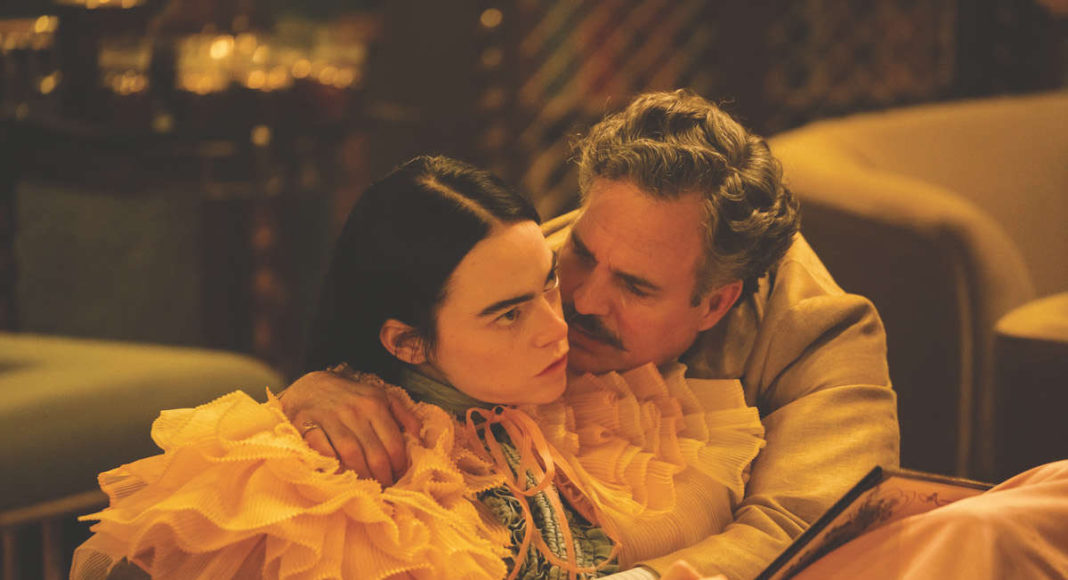The new film, Poor Things, lands with a thud. In a scenario lifted from countless vintage horror/sci-fi flicks, it’s the old story of a mad scientist, a young woman who falls under his control and an outlandish conception of interpersonal relations.
Strange things happen to Bella Baxter (Emma Stone) and Dr. Godwin Baxter (Willem Dafoe). Particularly to Bella. After she commits suicide by jumping off a bridge in the opening shot, “God”—that’s her name for the scientist—recovers and revives Bella’s corpse in his lab, transplanting the brain of her unborn baby into her cranium. The operation is a success.
And so we have the spectacle of an attractive, fully grown woman behaving like an infant: crying, wetting herself, throwing tantrums, gradually becoming physically coordinated and learning to talk. All this to the tune of British composer Jerskin Fendrix’s (real name: Joscelin Dent-Pooley) remarkably evocative, yet fully annoying, 20th century-modernist-style music track.
Poor Things is directed by Yorgos Lanthimos (The Favourite), with a screenplay adapted by Tony McNamara (Cruella) from a novel by Alasdair Gray, with both Lanthimos and Stone among the producers. It’s less an extension of The Favourite’s satiric nastiness than it is a whacky genre update with a cleverly hidden subtext. The more Bella relearns about being a woman, the more disgusted she is with the status quo.
The director enjoys playing games with history. In The Favourite, the 18th-century court of Queen Anne of England is home to randy shenanigans and power struggles in addition to mountains of bric-a-brac. That’s a similar case to Dr. Baxter’s Victorian London, but turned up a notch or two in the soft-core sex department.
“God” doesn’t exactly use Bella as a sex toy—to him she’s a scientific experiment in progress—but his acquaintances are not so scrupulous when it comes to a naive beauty open to suggestions. The “furious jumping” is played for broad laughs, but that sexual cruelty ruins whatever sympathy a viewer may have had for the scar-faced doctor, and turns Lanthimos’ tilted riffing on Bride of Frankenstein and Edward Scissorhands into a painful ordeal instead of a simple shaggy-dog lampoon.
For instance, when Bella discovers masturbation, it’s really nothing to rejoice about—at that stage she’s more of an artificial lust object than a woman with recognizable feelings. Her danse-mécanique body movements are similarly un-amusing. As depicted by Stone in a frantic performance, Bella might as well be an inflatable doll or a robot. The cheap chuckles continue in that vein for about half the film’s running time.
But then suddenly, after Bella is introduced to goofball sybarite Duncan Wedderburn (Mark Ruffalo) and they embark on a luxurious trip into the wondrous outside world, a major tonal shift occurs. In a welcome departure from the sophomoric look-at-the-freak antics of the film’s early scenes, Bella grows more complicated with age. She’s still absurdly oversexed and naive, but from a slightly more experienced point of view, and is quite capable of thinking for herself.
In scenes aboard an ocean cruise ship and later in the demimonde of Paris, the innocently curious Bella learns useful things from a pair of libertines (Hanna Schygulla, Jerrod Carmichael); the saturnine madam of a Parisian bordello (actor Kathryn Hunter, in a thrillingly corrupt supporting-award-contending role); and a fellow prostitute (Suzy Bemba).
There’s nothing remotely titillating about our heroine’s experiences, and yet the tale of Bella’s ironic “education” seems like another, better film entirely, compared to the marionette antics of the first half.
Stone’s career-best performance verges on brilliant. Classically inclined culture fans might be reminded of everything from Bernard Shaw’s Pygmalion to Kore-eda Hirokazu’s Air Doll to Alfred Hitchcock’s Rich and Strange.
Stone rises to the occasion, and so does Ruffalo. As for Dafoe, he recycles much of his oeuvre—nothing especially offensive about that. The production designers and art directors put on their own dazzling show. After its iffy first half, Poor Things emerges as a revelation.
In theaters











